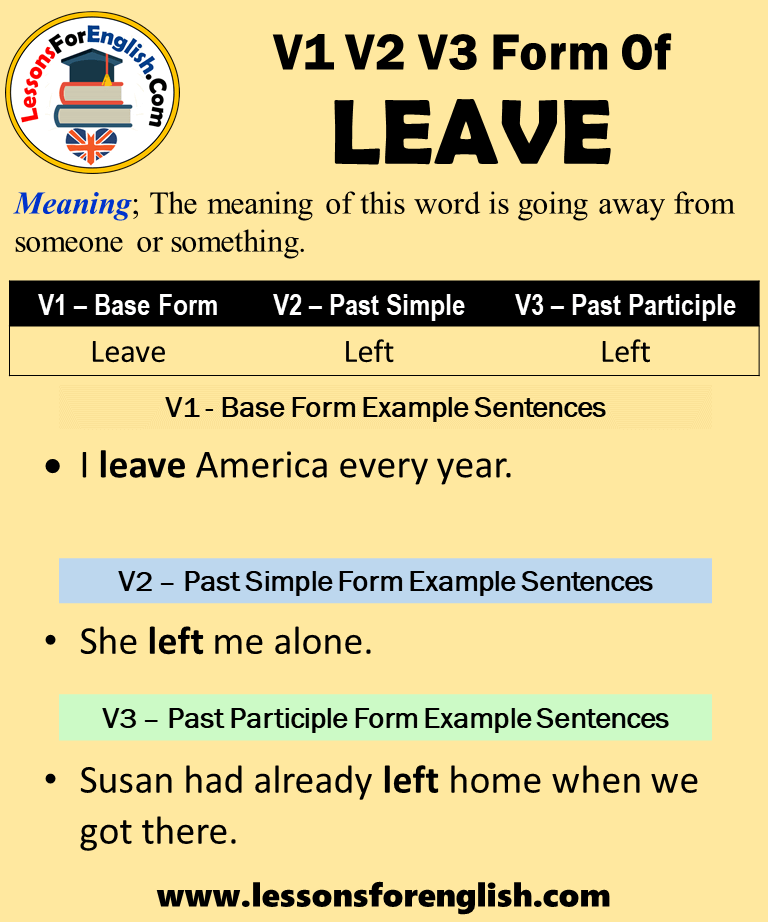
Past Tense Of Leave, Past Participle Form of Leave, Leave Left Left V1
Leave of Past Simple V2. The verb leave is also employed in its V2 form as "left'. It is used to indicate the past tense in sentences. Leave of Past Participle V3. The V3 form is identical to the V2 form. The V3 form is "left". Left is used in the past or present perfect tense.

Leave Past Simple, Simple Past Tense of Leave, Past Participle, V1 V2
'to leave' conjugation - English verbs conjugated in all tenses with the bab.la verb conjugator. bab.la - Online dictionaries, vocabulary, conjugation, grammar.. Past participle. left. Translations for "to leave" Translations for "to leave" in our English dictionaries "to leave" Spanish translation

Leave Past Simple, Past Participle, V1 V2 V3 Form of Leave English Vocabs
Most verbs have a past tense and past participle with -ed: worked played listened But many of the most frequent verbs are irregular: Irregular verbs Average Give it 1/5 Give it 2/5 Give it 3/5 Give it 4/5 Give it 5/5 Average: 4 (495 votes) ‹ Verb phrases Up Questions and negatives › Do you need to improve your English grammar?
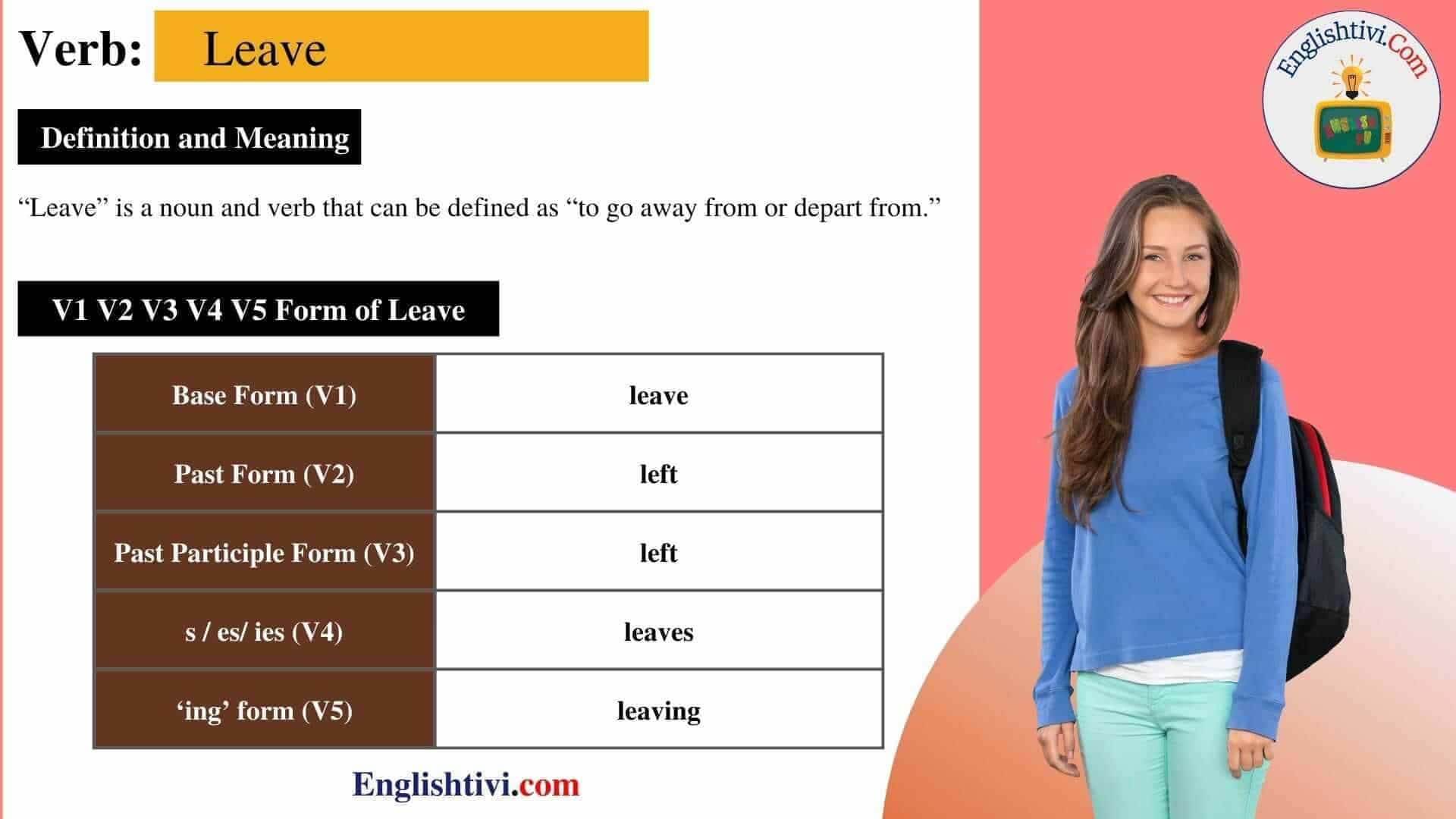
Leave V1 V2 V3 V4 V5 Base Form, Past Simple, Past Participle Form of
The Verb "Leave" in English Conjugation of "To Leave" The verb "leave" is an irregular verb. (This means that "leave" does not form its simple past tense or its past participle by adding "-ed" or "-d" to the base form.) The Five Forms of "To Leave" "To Leave" in All the Tenses
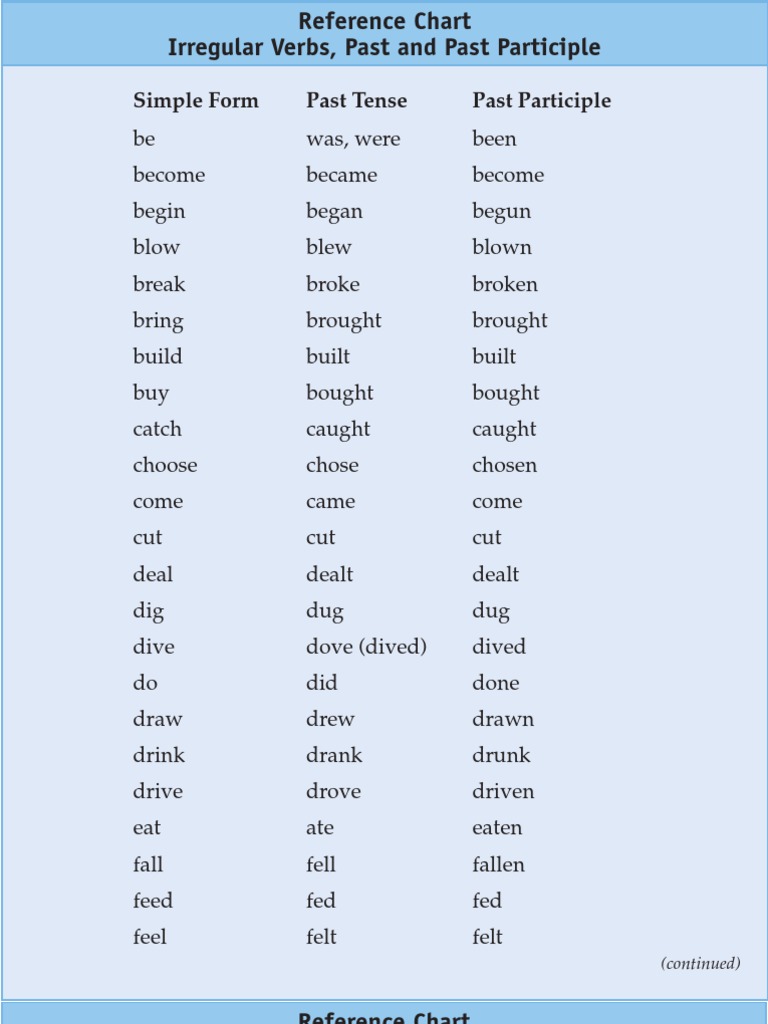
List of Past Participle Grammar Syntax
The past participles of irregular verbs don't follow a specific pattern and can have numerous endings. ⚡ Conjugation of the English irregular verb, past tense : 🧾 leave left left / laft - LEARN IV.com. EN. Learniv.com > en > English irregular verbs.

Leave Past Tense, Present and Future Conjugations, Leave V1 V2 V3
A past participle is a word formed from a verb that can be used as an adjective or to form verb tense. Most past participles end -ed, -d, -t, -en, or -n.. I hope that, when I leave this planet, I will have touched a few people in a positive way. (Actor Will Rothhaar) Forming the Past Participle (Regular Verbs).

Conjugación Leave 🔸 Verbo inglés en todos los tiempos y formas
English leave Infinitive to leave Preterite left Past participle left Model : leave Auxiliary : have, be Other forms: leave oneself / not leave Contractions Advertising Indicative Present I leave you leave he/she/it leaves we leave you leave they leave Preterite I left you left he/she/it left we left you left they left Present continuous
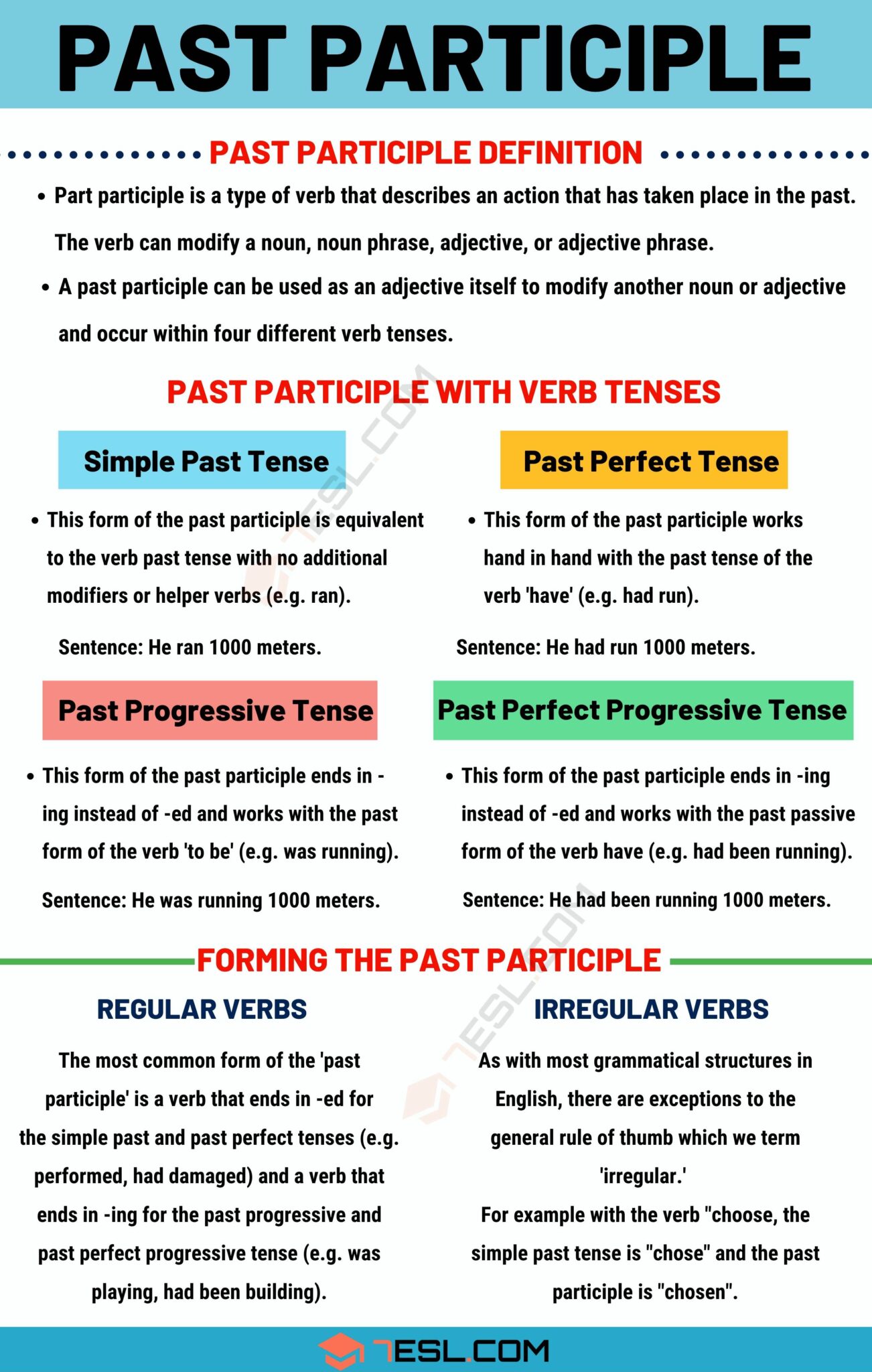
Past Participle Definition, Forming Rules and Useful Examples • 7ESL
Table of irregular verbs - English Grammar Today - a reference to written and spoken English grammar and usage - Cambridge Dictionary

Little Moon Leave PresentPastPast Participle TenseVerb Forms
The past tense of "leave" is "left.". It is an irregular verb, so it doesn't the standard rule adding -ed to the base form to form for forming the past tense of regular verbs. Here are some examples of past tense of leave: Present tense: I leave my house at 7 am. Past tense: Yesterday, I left my house at 7 am.

Leave Verb Forms, Base Form, Past Tense, Past Participle & V1 V2 V3
What is the past tense of the word "leave" The past tense (past participle) form of "leave" is "left." The infinitive of the word form is "leave." The present participle form is "leaving." The past tense form is "left" and past participle form is "left." Understanding verb tenses The general grammar rules that govern past tenses are as follows.

Irregular verbs
The English verb 'leave' is pronounced as [li:v]. Related to: irregular verbs. 3 forms of verb leave: Infinitive (leave), Past Simple - (left), Past Participle - (left).. Here are the past tense forms of the verb leave. 👉 Forms of verb leave in future and past simple and past participle. What is the past tense of leave.

Past Tense Of Leaving Leaved Or Left? (Pronunciation & Usage)
Conjugate the verb leave in all tenses: present, past, participle, present perfect, gerund, etc.

Leave Past Tense Verb Forms, Conjugate LEAVE
Irregular Verbs List Definition: To Leave Irregular verb: To Leave Verb conjugation: Leave - Left - Left Meaning of 'To Leave' To go out of a place Conjugation of verb 'Leave' Subscribe to Ad-Free Browsing Enjoy a seamless learning experience without interruptions from advertisements.

Simple Past Tense of Leave
'Left' is used in the case of Past Perfect Tense or Present Perfect Tense. If the question is in the present perfect tense, we use the word leave as have+left or has+left. The subjects I, you, we are used as 'have+left'. The subjects he, she, it are used as 'has+left'.
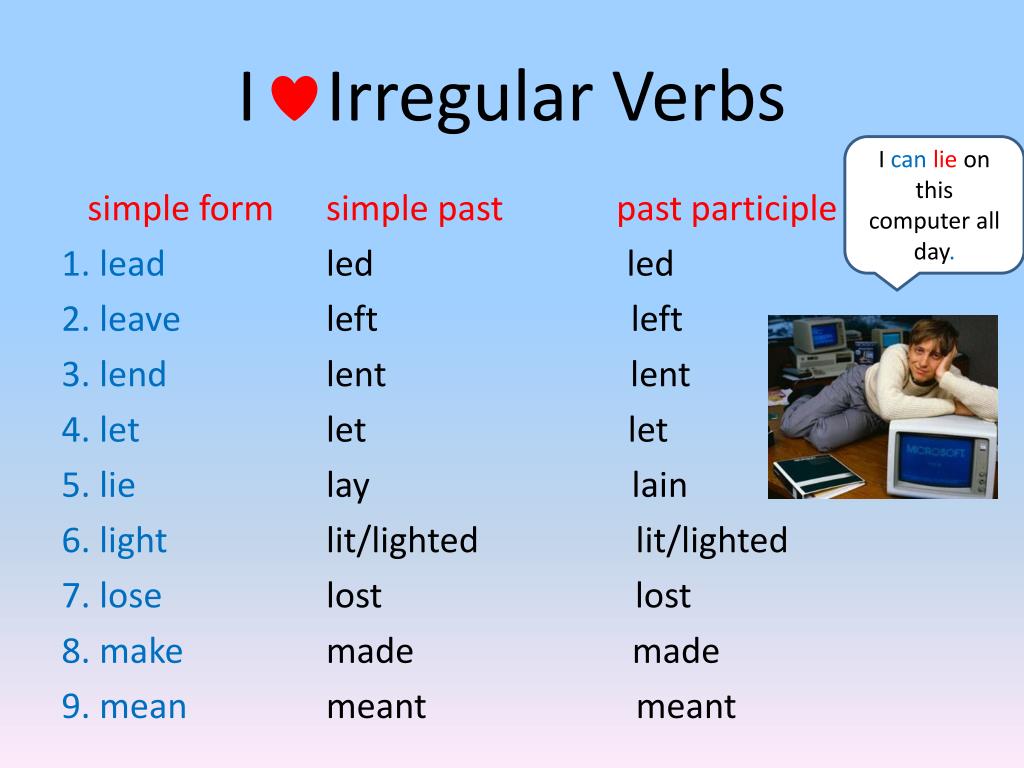
Past Tense Of Leave / See Past Simple, Simple Past Tense of See Past
Left is the past tense of the word leave. Left is the past participle of the word leave. leve past form, verb forms, v1v2v3, Infinitive
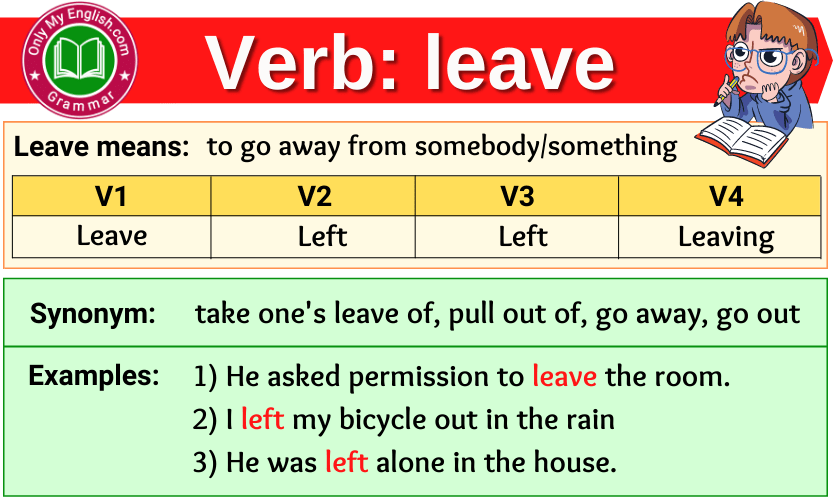
Leave Verb Forms Past Tense, Past Participle & V1V2V3
At this point, you may pose the relevant question: "What is the past tense of leave?" because "leaving" is not the base form. Indeed, "leaving" is the present participle form of "leave". "Left" is the correct response, which is spelled L-E-F-T. Amazingly, leave in past participle share the same form and pronunciation. Keep.